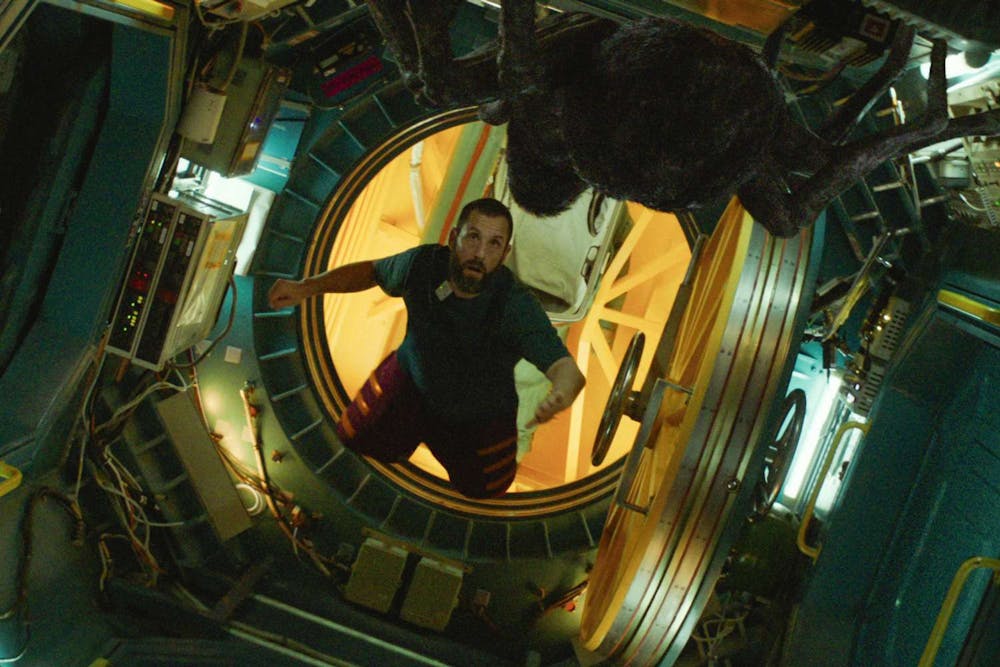Adam Sandler’s 12th movie produced by Netflix, “Spaceman,” is ambitious, self-knowingly quirky and, ultimately, disappointing. Sandler stars as a Czech astronaut, Jakub, alongside fellow heavy-hitters: Carey Mulligan as Lenka, his pregnant, estranged wife and Paul Dano as Hanuš, the voice of his primordial arachnid companion (I know, quite the string of words).
“Spaceman” follows Jakub, a lonely, selfish astronaut (that surprisingly does a lot of advertising) on his journey to visit a mysterious, purple particle cloud that has suspended over Earth’s sky for the past four years. Along his journey, he is miraculously visited by Dano’s Hanuš, leading him on a journey to hopefully resolve his relationship with his wife, his father and himself.
These are big ideas for an ostensibly forgettable movie. “Spaceman” is not the worst thing on Netflix, nor is it the most forgettable of Sandler’s ventures with the streaming giant. It is, though, a failed experiment.
Drawing parallels to the “space as a mirror for the inner self” genre and heavy-hitters like “Solaris” (moreso Soderbergh’s than Tarvovksy’s), “Moon,” “Sunshine” and “Ad Astra,” “Spaceman” doesn’t quite size up. Jakub is too sullen and quiet to express himself in the ways he must, Dano’s whispery voice is lazy and hard to separate from the mental image of him recording it in a studio in Burbank and Mulligan tries her best with a completely underdeveloped wife character.
For a movie dependent on the relationships between Sandler and Dano / Mulligan, “Spaceman” fails to make any sincerity believable. First, Dano is a practically eternal talking spider. Second, the only moments where we see Sandler and Mulligan interact are warped to look like the sight of a spider (not conducive to the audience’s emotional investment) and, within these moments, Sandler is cold, distant and an overall jerk to the woman we are supposed to believe fell in love with him.
Beyond the foundation of the film, “Spaceman” redeems itself with a unique, 70s-inspired set design and a unique conception of what the particle cloud contains. The particles of the clouds are told to us as having been present since the beginning of the universe, containing within themselves the simultaneous inaction of every moment. In an obvious homage to the stargate of Kubrick’s “2001: A Space Odyssey,” Sandler sits within the cloud, overwhelmed by the divinity of what is transpiring around him. It is beautiful, rushed and emblematic of the entirety of the film: ideas are posed, no real answers are given and Sandler lacks any form of passion.
If you’ve been reading carefully, you’ll notice that I brought up the relationship between Sandler and his father, how Sandler’s Jakub is Czech and that he is a uniquely commercial astronaut — then not mention any of that again. If this is you: Congrats! You’re starting to understand everything wrong with “Spaceman.”
Beyond inadequate probing of real ideas, the film offers themes and ideas like: “what does it mean to be a son,” “how does scientific discovery interplay with our personal relationships,” “what if astronauts were our celebrities” or “what if a former Soviet nation was the leader in space exploration.” It then fails to actively engage with any of them.
These flaws are what prevent “Spaceman” from being a good movie, a fun bad movie or even just a bad movie. It has the pace and temperament of a film that has something to say beyond its plot but the execution of a Netflix original. If the plot or themes discussed above seem interesting, just watch one of the movies it is trying to be. If you want to see any of these three actors be amazing, watch just about anything else they’ve been in.
Get The Chronicle straight to your inbox
Signup for our weekly newsletter. Cancel at any time.

